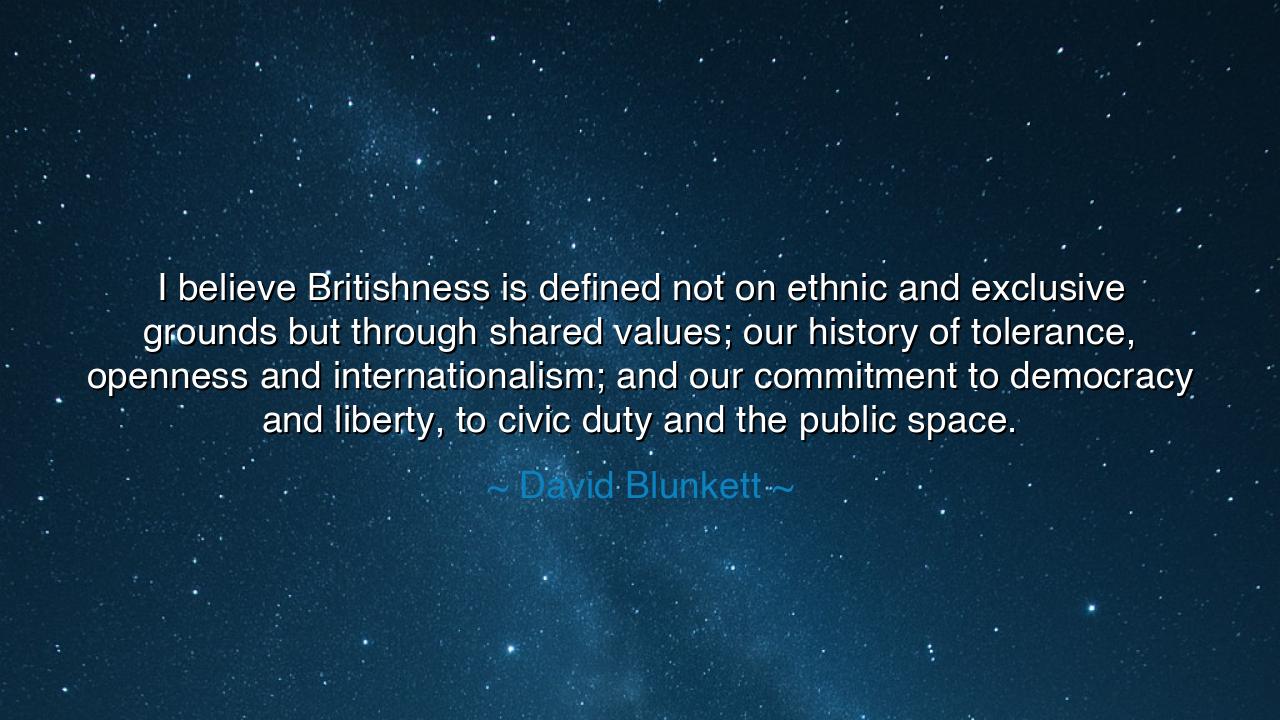
I believe Britishness is defined not on ethnic and exclusive
I believe Britishness is defined not on ethnic and exclusive grounds but through shared values; our history of tolerance, openness and internationalism; and our commitment to democracy and liberty, to civic duty and the public space.






The words of David Blunkett, when he declared, “I believe Britishness is defined not on ethnic and exclusive grounds but through shared values; our history of tolerance, openness and internationalism; and our commitment to democracy and liberty, to civic duty and the public space,” echo like a bell across the ages. They summon the spirit of a nation not as a fortress of blood or birthright, but as a living covenant of the heart — a fellowship of values, of duty, and of freedom. To speak thus is to rise above the narrow borders of lineage and proclaim that a people are bound not by the accidents of their ancestry, but by the ideals they cherish and the virtues they practice.
In this vision, Britishness is not a possession inherited; it is a calling lived. It is forged in the fires of struggle and tempered by acts of tolerance, by the courage to listen to voices unlike one’s own. To be British, in this sense, is not to close the gates of belonging, but to extend the hand of fellowship to all who uphold the same noble principles — of openness, of justice, of public spirit. This is a patriotism of the spirit, not of the soil; it belongs to those who work not for themselves alone, but for the common good.
Let us recall a story from that long history of liberty that Blunkett invokes. In the dark days of 1940, when the skies over London burned with fire and the hearts of many were gripped by fear, men and women from every corner of the empire — Indians, Caribbeans, Africans, Canadians, Australians — stood together beneath the same sky, defending the island not merely for Britain, but for the idea of freedom itself. Their faces were many, their tongues diverse, but their resolve was one. And in that unity of purpose, the spirit of openness and internationalism was revealed: a truth that nations are strongest not when they are pure, but when they are just.
It was in such moments that the democratic flame — fragile but enduring — burned brightest. Britain’s greatness did not spring from conquest alone, but from its capacity for self-reflection and renewal. When the tide of empire receded, when the world turned and Britain became a haven for new peoples, new faiths, new dreams, the essence of its identity was tested again. And yet, in each generation, there have been those who stood up to declare that liberty and fairness are not gifts to be hoarded by the few, but duties shared by the many. This is the heart of civic life — the public space where we meet as equals, not as tribes.
To live by such a creed requires courage — the courage to look upon difference not as a threat, but as a teacher. It demands that we defend democracy not in name only, but in action: by speaking truth to power, by serving one another, by cherishing those institutions that give voice to all. Liberty without civic duty is a hollow echo; tolerance without engagement is a ghost. The true citizen stands not idle in comfort but moves with conscience, seeking to mend the torn fabric of the world wherever he or she walks.
Thus, Blunkett’s words become a kind of modern scripture for any nation that would remain noble in spirit. For what he spoke of Britishness applies, in truth, to all peoples: that identity built on exclusion decays, but identity built on values endures. Nations are not born perfect — they must be reborn continually through acts of compassion, courage, and participation. To be British, then, is to be a custodian of ideals that outlive generations.
The lesson is clear for us who listen: let not your belonging be bounded by the color of your skin or the tongue of your ancestors. Rather, anchor it in the virtues that elevate mankind — tolerance, fairness, service, and the defense of liberty. Walk among others not as stranger, but as steward. Seek always to build bridges where others raise walls. For it is through shared values that a people truly endure, and through civic duty that freedom keeps its flame.
So, let every reader take up this charge: serve the public space. Speak with kindness. Act with justice. Defend the liberty of those who cannot defend themselves. For these are the stones upon which the temple of any nation is built — and only when its people live by such principles can they say, with truth and with pride, that they belong.






AAdministratorAdministrator
Welcome, honored guests. Please leave a comment, we will respond soon